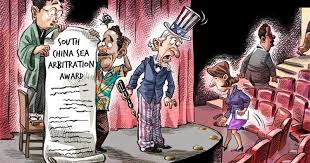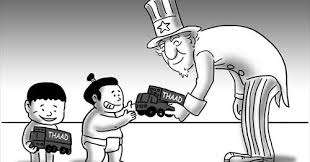https://youtu.be/p57piVGcVqg
August 15 marked the 71st anniversary of Japan's unconditional surrender during World War II. However, on this special day when Japan should spend time reflecting on its history of militaristic aggression, its Prime Minister Shinzo Abe sent a ritual offering to the notorious Yasukuni Shrine.
The Yasukuni Shrine, which honors 14 Class-A convicted war criminals among 2.5 million Japanese war dead from WWII, is regarded as a symbol of past Japanese militarism.
The honoring of war criminals, no matter what form it takes, only serves to further hurt those Asian neighbors that Japan once invaded. Such perverse acts to whitewash its crimes of military aggression runs contrary to the pursuit of peace in Asia and the world at large.
It's common knowledge that the Yasukuni Shrine is a source of spiritual inspiration for Japan to start another war of aggression. Yet, the country's new Defense Minister Tomomi Inada has tried to associate such a notorious place with the mourning of soldiers belonging to Japan’s Self-Defense Forces.
She claimed at a recent seminar that “the Yasukuni Shirine is not the place to vow not to fight. It needs to become a place where we vow to desperately fight when our Motherland is at risk.” Her words shocked even the Kyodo News.
The 71-year-peace after WWII was hard-won. Born from the victory over fascism, this peace has been the foundation for post-war international order. This conclusion is not something that can be ignored, denied or overturned by any country.
World peace and the post-war order, which came at the cost of the blood and lives of the peoples of Allied countries, is closely tied to justice.
Last year, the world commemorated the 70th anniversary of the end of the World Anti-Fascist War, but some countries, looking out for their own interests, have turned a blind eye to the wrongdoings of Japan and have even urged Japan to abandon its pacifist constitution. The world today is witnessing the negative impact brought about by this short-sighted strategy.
By erasing its invasion history, Japan is on one hand attempting to lock away memories of the war and on the other hand setting the stage for future action. In the House of Councillors election in July, lawmakers pushing for Constitution amendments won more than two-thirds of seats. This has led to forward-thinking people in Japan to also begin worrying about the “return of war.”
In order to strengthen military power and shake off the post-war order, the Abe administration usually uses the so-called “China threat” as an excuse to deceive the Japanese public and other parts of the world.
After Japan adopted its new security laws that lifted a decades-old ban on collective self-defense, the Abe administration has been making every effort to contain China by instigating disputes between China and other countries.
On the day when the so-called arbitral decision on the South China Sea dispute was announced in July, Japan, a non-party in the issue, immediately pressured China to accept the arbitration. At the following 11th Asia-Europe Summit and foreign ministers' meetings on East-Asia cooperation held in last month, Japan reiterated its stance again and again.
In the country’s annual defense white paper issued in early August, Japan pointed fingers at China over the South China Sea issue once again. The paper also made irresponsible remarks concerning China’s armament, military expense and transparency. These actions by the Abe administration has triggered alarm and concern throughout the international community.
Japan's tribute at the Yasukuni Shrine on Monday once again reminds us that world peace is not that should be taken for granted, it demands continual justice and also the capability to defend it.- People's Daily
Japan’s intervention in South China Sea perverse, vicious: expert
Japan’s efforts to muddle the waters of the South China Sea are perverse acts that turn back the wheel of history, a Chinese expert wrote on Monday in an article that marked the 71st anniversary of Japan's unconditional surrender in World War II and called on the public to ponder Japan’s real intentions.
In the People’s Daily article, Hu Dekun, the president of China Association for History of WWII, pointed out that the war of aggression initiated by Japanese fascists during the 1930s and 1940s had brought tremendous disaster to people both in China and the Asia-Pacific region.
As an assailant country, Japan should be held accountable for its war crimes. However, in order to cement its global hegemony, the US, who then exclusively occupied Japanese territory, allied with the latter in the hopes of dominating the Asia-Pacific order.
But instead of repenting for its war crimes and improving ties with the victimized countries, Japanese right-wing politicians started bullying other countries under the support of the US, read the article, titled “Perverse Acts of Japanese Government.” Things got worse after the US adopted its “Asia-Pacific Rebalance” policy, Hu writes, citing the South China Sea issue as an example.
Hu noted that in a bid to contain China, Japan repeatedly instigated disputes between China and other countries around the South China Sea. Japan, a country not involved in the South China Sea issue, joined the US as another agitator in meddling the waters.
According to Hu, Japan is attempting to get rid of the post-war order by amending its constitution.
After Japan officially adopted the new security laws that lifted the decades-old ban on collective self-defense, the country is now planning a constitution amendment. But the biggest roadblock ahead is public support. The Abe administration is seeking that support by playing up the “China threat.”
What’s more, Tokyo hopes divert public’s attention from other domestic issues. The Abe administration has lost credibility after "Abenomics" failed to revive the Japan’s sluggish economy. By fanning the flames of the South China Sea issue, the administration hopes to route domestic conflicts and consolidate its power.
By poking its nose in the South China Sea, Japan wishes to buddy up to the US. Though the US tried to manipulate some counties to challenge China, its “Asia-Pacific Rebalance” policy suffered serious setbacks by China's diplomacy, friendships and policy of win-win cooperation, especially as the “Belt and Road” initiative aims to benefit most of its neighboring countries. Japan wants to take this chance to curb China so that it could pander to its alliance with the US.
“What’s Japan's real intention for interfering in the South China Sea issue? Is Japan going to repeat its mistakes? ”asked Hu. - People's Daily
Related posts:
Aug 6, 2016 ... Once again, in its latest defense white paper, Japan has shamelessly accused
China of jeopardizing regional peace and stability, playing up ...

Jul 18, 2016 ... China hardens after questionable tribunal ruling on South China Sea ....
Permanent Court of Arbitration clarifies role in South China Sea case THE
HAGUE, July 16 ... 不合法的裁决不过废纸一张, Illegal ruling but a waste paper.

5 days ago ... Beware of meddling via soft power ! Joining the club - Illustration: Shen Lan/GT.
MEDDLING by foreign powers is an established phenomenon ...

 A Japanese right-winger captured in photo at Yasukuni Shrine on the 71st anniversary of Japans surrender in World War II on August 15, 2016. Yasukuni enshrines war criminals, and as such visits by Japanese politicians tend to provoke anger from neighbors China and Korea that suffered from Japans militarist past.
A Japanese right-winger captured in photo at Yasukuni Shrine on the 71st anniversary of Japans surrender in World War II on August 15, 2016. Yasukuni enshrines war criminals, and as such visits by Japanese politicians tend to provoke anger from neighbors China and Korea that suffered from Japans militarist past. Chinese PLA Navy staged drills in the waters of South China Sea on July 8, 2016.
Chinese PLA Navy staged drills in the waters of South China Sea on July 8, 2016.
No comments:
Post a Comment